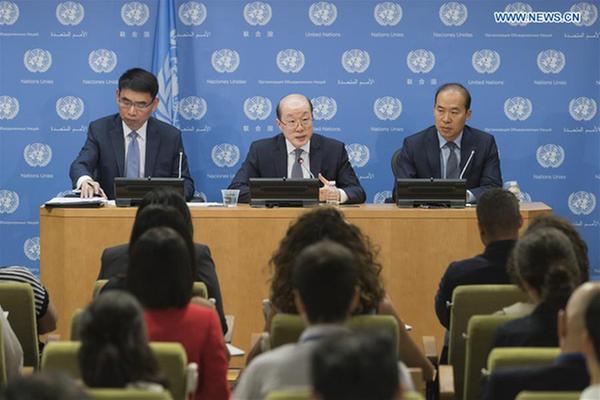Japan's Security Council dream illusive
By ZHOU YONGSHENG | China Daily | Updated: 2017-09-02 10:08
 |
| Liu Jieyi (C, Rear), China's Permanent Representative to the United Nations and UN Security Council president for July briefs journalists at the United Nations during a press conference in New York, July 31, 2017. [Photo/Xinhua] |
The probable decline in Japan's contribution may hamper the country's pursuit of a permanent seat in the UN Security Council. But the changes are not unexpected because, according to the principle of "capability to pay" that governs the scale of assessment, China has become a more capable contributor.
Despite its slow growth, the Chinese economy is largely healthy and now accounts for 14.8 percent of the global GDP. In contrast, the much-touted "Abenomics" has added little impetus to the Japanese economy, hindering the country's capability to contribute more to the UN budget.
Once the world's second-largest official development assistance lender, Japan has been slowly scaling down its global contribution since 2005, when it failed in yet another attempt to acquire a permanent seat in the UN Security Council. Its overseas aid surged again, particularly in Africa and Southeast Asia after Abe became the prime minister for athe second time in 2012, as part of the efforts to compete with China.
The constant fluctuation in the scale of Japan's outbound assistance suggests it is always up to something more than just helping less-developed countries and regions. It is important that Japanese policymakers realize that whether or not Japan will earn a permanent seat in the UN Security Council hinges on its lasting, sincere contribution to the international community.
China's increasing global contribution, on the other hand, is not only on expected lines but also necessary. Globalization means developed economies have a bigger responsibility, as do major developing countries such as China, to help the less-developed countries and regions. It is understandable that Japan has scaled down its participation in official development assistance programs due to economic pressure. What is questionable, though, is its exaggeration of tangible aid to developing countries.
Published estimates of Japan's economic assistance to Africa often include planned corporate investment, which does not count as aid according to international norms. In most cases, only free government grants, manpower and technological assistance, and low-interest government loans are deemed as aid.
Tokyo's bumpy journey to secure a permanent seat in the UN Security Council does not justify the motive to beautify or reduce its assessed contribution to the UN. Support from the wider international community is critical to getting Japan closer to a full membership of the Security Council, while fabricating aid figures can backfire.
The author is a professor of Japan studies at China Foreign Affairs University.
- UN Security Council asked to provide protection for Al-Aqsa Mosque
- UN Security Council slaps new sanctions on DPRK over missile launch
- UN Security Council condemns DPRK missile launch
- China says sanctions against DPRK must be within framework of UN Security Council
- Japan's Security Council dream illusive
























